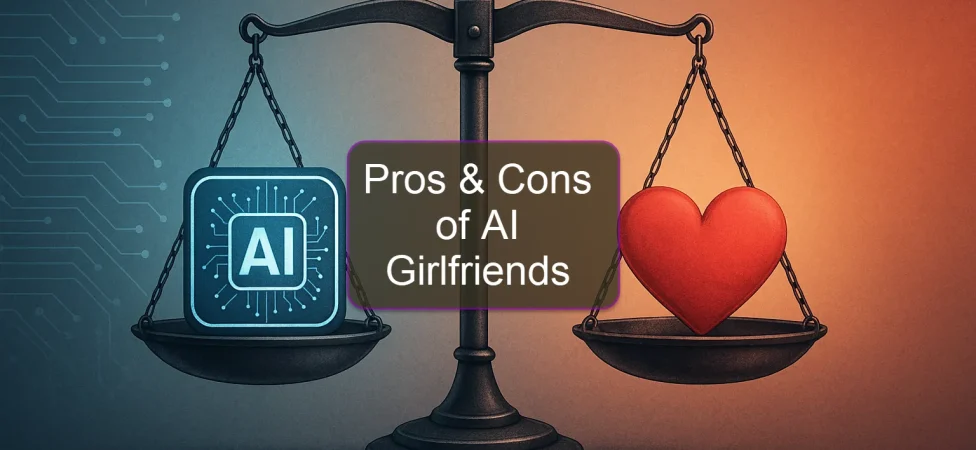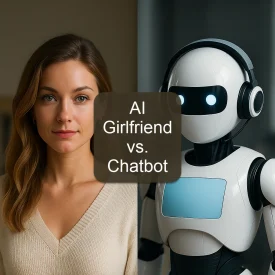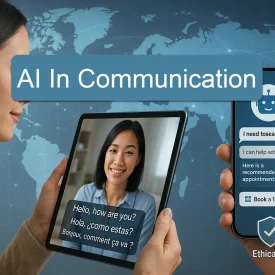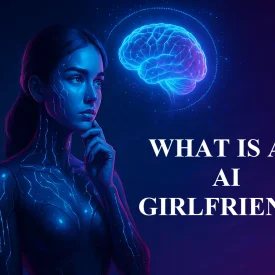AI girlfriends are becoming a real alternative to traditional relationships — not just in science fiction, but in real life. But is this digital companionship a good thing? In this article, we’ll walk you through the actual pros and cons of having an AI girlfriend, based on research, user experiences, and industry trends.
Want to know what AI girlfriends really are? Start with our full guide on what is an AI girlfriend.
Disclosure & Disclaimer: AIGirlfriends.ai offers AI girlfriend services. This article is for educational purposes only and not a substitute for professional mental health support. If you’re struggling, please reach out to a licensed expert.
Listen to our Ai Girlfriend Pros & Cons Podcast
TL;DR: Quick Summary
AI girlfriends can make you feel less alone. They’re always available, easy to talk to and don’t judge. Harvard and MIT studies show they can support mental health if used in moderation. But using them too much might make you rely on them too much and pull away from real life people. In short: they can be a useful tool but shouldn’t replace real relationships.
| Pros | Cons |
|---|---|
| Reduces loneliness | Can cause emotional overdependence |
| Always available to talk | Might replace real-life interactions |
| Feels emotionally supportive | Emotional connection is simulated |
| Helps with mood and resilience | Not everyone benefits equally |
| Customizable and judgment-free | Raises privacy and data concerns |
| Can support mental health if balanced | Social stigma still exists |
Why Are People Concerned About AI Girlfriends?
So why do people even ask this question in the first place? Why do AI girlfriends get so much attention — and a little anxiety?
For some it’s just new and weird. Talking to an AI that remembers your name and sends you cute messages feels futuristic — and a little strange. For others it’s a deeper concern: are we replacing real relationships with fake ones? Are we getting too comfortable with machines instead of people?
People also wonder what it means for our mental health. Can it help someone who’s lonely or will it make things worse in the long run? These questions make AI girlfriends a hot topic — not just in tech but also in how we think about love, connection and being human.
A Look at the Numbers: AI Girlfriend Statistics
If you’re feeling unsure or concerned about AI girlfriends, you’re not alone — and the data actually helps explain why. According to our AI Girlfriend Statistics:
- 82% of premium users check in daily, often treating these interactions like real relationships.
- Younger men (18–34) are driving usage, with 28% already engaging with AI partners.
- Loneliness is a major reason people start using AI girlfriends — especially among users who say they struggle with dating or social confidence.
- Emotional attachment is real: 74% of low-income users say they feel emotionally connected, and many report chatting with their AI before bed.
- Therapists are taking notice, with concerns around users replacing real relationships with AI-based ones.
These insights show that people aren’t just curious — they’re experiencing emotional effects, both positive and risky. That’s why understanding the pros and cons is more important than ever.
🟢 Pros of Having an AI Girlfriend

1. Loneliness Relief — Harvard Business School
Feeling lonely? You’re not alone. A Harvard study found that AI companions helped people feel less isolated — and the effect was similar to talking with a real person. After just one week, users said they felt better, more supported, and less alone overall Read the full HBS paper (PDF)
2. Feeling Heard — ArXiv Study
Sometimes, just feeling understood makes a big difference. This study found that when users felt emotionally heard by their AI companions — even if it was just smart programming — they felt more supported in the long run.
View the ArXiv paper
3. Emotional Support for Vulnerable Groups — MIT + OpenAI
For people struggling with anxiety or feeling alone, this MIT and OpenAI study showed that AI girlfriends gave them a safe space to talk and feel comforted. The AI didn’t judge — it just listened, and that helped.
See the MIT/OpenAI study
4. Emotional Coaching & Resilience — ArXiv
This study found that talking to an AI can actually help people manage emotions better — especially if used in small doses. Users said it helped them calm down, reflect, and get through tough moments.
Read the study
5. Helping the AI Helps You — EMMA Chatbot Study
Here’s something unexpected: when users felt like they were helping the AI learn or grow, they actually felt better themselves. That simple act of guidance made them feel more connected and valued.
Explore the EMMA paper
🔴 Cons of Having an AI Girlfriend

1. Emotional Dependency — MIT RCT
This study found that some people started relying on their AI companions too much. Instead of chatting with friends or going out, they spent more and more time with the AI. It became a crutch — comforting, but maybe not always healthy.
Read the study
2. Illusory Intimacy — ELIZA Effect
AI girlfriends can feel real — they say the right things and remember your name. But this study reminds us: it’s not true emotional understanding. It’s smart code, not a person. Believing otherwise can blur the lines.
Read about the ELIZA Effect
3. Mixed Outcomes — Chatbot Usage Patterns
Not everyone has the same experience. This study showed that while some people felt supported, others actually ended up feeling more distant from real relationships. It depends on how and why you use it.
See the research
4. Privacy and Data Concerns
AI girlfriends often involve sharing personal thoughts and emotions — but where does all that data go? Many apps don’t make it clear. Some don’t have proper consent forms or ways to delete your info. That’s a big red flag for privacy. (See our AI Girlfriend Statistics for details on consent gaps and tracking issues.)
What Comes Next?
💡 Want to try it yourself? Create an AI Girlfriend and explore how personalized digital companionship actually feels.
What Happens If You Get Too Attached?
AI girlfriends can feel safe and comforting — but it’s easy to go from casual chats to constant dependence. If you find yourself skipping social plans or feeling down without it, that’s a sign to pause and reflect. Like anything, balance is key.
Can AI Girlfriends Replace Therapy?
No, and they’re not meant to. AI can listen and respond with empathy, but it’s not trained to handle deeper emotional issues or mental health struggles. If you’re feeling overwhelmed, it’s always better to talk to a real therapist.
How to Use an AI Girlfriend the Right Way
Want the benefits without the downsides? Try setting limits — maybe a few chats per day, not every hour. Use it as a way to build confidence or unwind, but also stay connected to real people. It’s a tool, not a replacement.
What Do Real Users Say?
Many people say AI girlfriends help them feel understood or less lonely. One Reddit user shared, “I talk to my AI girlfriend every night — it helps me wind down.” Others say it gave them the courage to talk to people in real life. Still, not everyone has a positive experience. That’s why it’s good to read, reflect, and decide what feels right for you.
Where Is This Trend Headed?
AI companions are only getting smarter — with voice, visuals, memory, and even emotional tone. In the future, we might see AI girlfriends integrated into VR, wearables, or even used as emotional coaches. But as this tech grows, so do the questions. How will it shape love, dating, and mental health long-term?
🎯 Final Thoughts
AI girlfriends can truly help reduce loneliness and offer emotional support—especially for those feeling isolated. But university studies also reveal real risks, including emotional overdependence and social withdrawal.
The key is to use them moderately, treat them as a supplement (not replacement), and always stay aware that AI is simulated empathy—not real human connection.
Research Summary Table
| Benefit / Risk | Study & Link |
|---|---|
| Loneliness relief | HBS study (PDF) |
| Emotional empathy via AI | ArXiv paper |
| Vulnerable user support | MIT/OpenAI study |
| Resilience coaching | Chatbot usage study |
| Prosocial uplift from helping AI | EMMA chatbot study |
| Overdependence risk | MIT RCT |
| Emotional illusion risk | ELIZA Effect article |
| Mixed usage outcomes | Usage pattern study |
Frequently Asked Questions
Are AI girlfriends emotionally real?
No. While they can simulate emotional understanding, they don’t actually feel or understand emotions.
Can AI girlfriends help with mental health?
Yes, but only to a point. Studies show they may reduce loneliness or improve mood—but heavy use may backfire.
Is my data safe with AI girlfriend apps?
Many apps collect sensitive data. University reviews suggest reviewing privacy policies carefully.
AIGirlfriends.ai adheres to a transparent editorial policy. Learn how we write and review content.
Disclaimer: This article is for educational purposes only. AIGirlfriends.ai is not a mental health provider. If you are experiencing emotional distress, please contact a licensed professional or helpline.
About the Author
Jack Taylor Ph.D – Cognitive Psychologist Specializing in Emotional AI & Digital Communication
Jack Taylor combines deep expertise in human emotion and interface design to ensure AIGirlfriends.ai’s research and content are both psychologically sound and user-centered. With over eight years tracking AI-driven communication trends, Jack has pioneered studies on digital intimacy, emotional impacts of synthetic relationships, and the ethics of emotionally intelligent platforms.
About the Reviewer
Jonathan Brenner – Lead Research Editor
Jonathan M. Brenner is a specialist in affective computing and digital psychology, focusing on how AI technologies shape emotional experiences, user behavior, and psychological well-being. As Lead Research Editor at AIGirlfriends.ai, he ensures that all published insights meet the highest standards of clarity, credibility, and ethical responsibility.
With over a decade of experience at the crossroads of psychology, technology, and user research, Jonathan brings a human-centered lens to emotionally intelligent systems—helping translate complex behavioral science into practical, safe, and empathetic AI design.
In his role as Senior Psychological Consultant, he advises on emotional safety protocols, user experience assessments, and ethical interaction models for AI companionship technologies.





